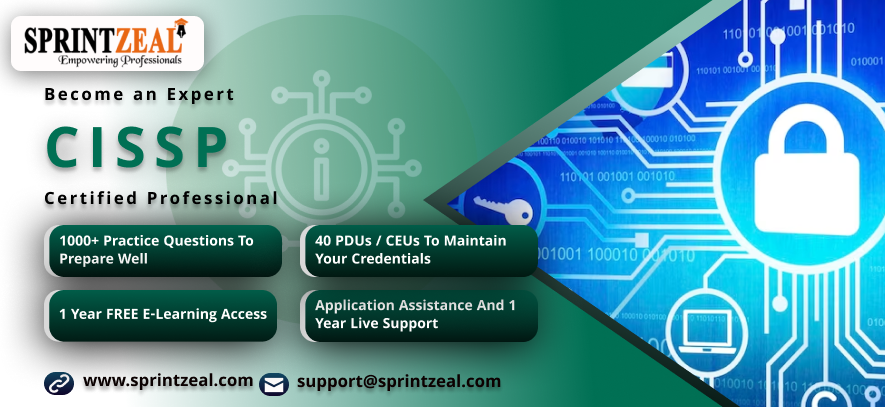In the rapidly evolving world of information technology, the need for robust security measures has become paramount. As cyber threats increase in complexity and frequency, organizations are in dire need of professionals who can protect their digital assets. One of the most respected and sought-after credentials in the field of cybersecurity is the Certified Information Systems Security Professional (CISSP) certification. Recognized globally, the CISSP certification is a testament to an individual’s expertise and commitment to the field of information security.
In this comprehensive guide, we’ll explore what the CISSP certification in Chicago IL entails, why it is valuable, how to obtain it, and tips for preparing for the exam.
What is the CISSP Certification?
The CISSP certification is an advanced-level credential offered by (ISC)², the International Information System Security Certification Consortium. It is designed for experienced security practitioners, managers, and executives who are responsible for overseeing and managing an organization’s security posture.
The certification covers a broad range of security topics, including risk management, asset security, security engineering, communication and network security, identity and access management, security assessment and testing, security operations, and software development security. These topics are organized into what (ISC)² calls the “Common Body of Knowledge” (CBK).
Why is the CISSP Certification Valuable?
Global Recognition
CISSP is one of the most globally recognized certifications in the cybersecurity industry. Holding this credential demonstrates that you have the knowledge and skills to design, implement, and manage a best-in-class cybersecurity program. Employers worldwide value CISSP-certified professionals because of the rigorous standards the certification upholds.
Career Advancement
The CISSP certification opens doors to higher-level positions in the cybersecurity field. Whether you’re aiming for a role as a Chief Information Security Officer (CISO), Security Consultant, IT Director, or Security Analyst, the CISSP can give you a competitive edge. According to (ISC)², CISSP professionals are among the highest-paid in the industry, and the certification often leads to significant salary increases.
Holistic Understanding of Security
The CISSP exam covers eight domains, providing a comprehensive understanding of information security. This broad coverage ensures that certified professionals can approach security from various angles, making them more effective in protecting organizations from diverse threats.
Compliance with Industry Standards
Many industries require compliance with certain security standards and frameworks. CISSP-certified professionals are often better equipped to ensure that their organizations meet these standards, such as ISO/IEC 27001, NIST, and GDPR. This is particularly important for sectors like finance, healthcare, and government, where regulatory compliance is critical.
Who Should Pursue the CISSP Certification?
The CISSP certification is ideal for experienced IT security professionals who want to advance their careers. It is particularly suited for individuals in the following roles:
- Security Consultant/Manager
- IT Director/Manager
- Security Auditor
- Security Architect
- Security Analyst
- Security Systems Engineer
- Chief Information Security Officer (CISO)
To qualify for the CISSP exam, candidates must have a minimum of five years of cumulative, paid work experience in at least two of the eight domains of the CISSP CBK. However, a one-year experience waiver can be granted for candidates with a four-year college degree or an approved credential from the (ISC)² list.
CISSP Certification Domains
The CISSP exam covers eight domains, each representing a crucial area of information security. Understanding these domains is essential for passing the exam and excelling in your cybersecurity career.
-
Security and Risk Management
This domain focuses on the foundational concepts of information security, including governance, risk management, and compliance. It covers legal and regulatory issues, professional ethics, and security policies and procedures. -
Asset Security
Asset security involves the protection of physical and digital assets, including data classification, ownership, privacy protection, and data retention. -
Security Architecture and Engineering
This domain addresses the design and architecture of secure systems. It covers secure engineering processes, security models, cryptography, and security architecture vulnerabilities. -
Communication and Network Security
Communication and network security cover the design and protection of network architectures. Topics include secure communication channels, network attacks, and network security controls. -
Identity and Access Management (IAM)
IAM is about managing identities and controlling access to information. This domain covers authentication, authorization, identity management, and access control mechanisms. -
Security Assessment and Testing
Security assessment and testing involve evaluating the effectiveness of security controls. This domain includes security audits, vulnerability assessments, penetration testing, and continuous monitoring. -
Security Operations
Security operations focus on the day-to-day management of security in an organization. Topics include incident management, disaster recovery, business continuity, and operational resilience. -
Software Development Security
This domain covers the principles and practices of secure software development. It includes software development lifecycle (SDLC) security, application security controls, and secure coding practices.
The CISSP Exam: What to Expect
Exam Format
The CISSP exam is a challenging test that assesses your knowledge across the eight domains. The exam consists of 100-150 multiple-choice and advanced innovative questions. The exam duration is three hours, and it is administered in a Computerized Adaptive Testing (CAT) format. This means that the difficulty of the questions adjusts based on your performance, and the test ends once it has determined your level of competence.
To pass the exam, you must score at least 700 out of 1000 points.
Exam Cost
As of 2024, the CISSP exam costs approximately $749 USD. However, prices may vary depending on your location and whether you qualify for any discounts or vouchers.
Study Resources
Preparing for the CISSP exam requires a significant investment of time and effort. Fortunately, there are numerous resources available to help you succeed.
- Official (ISC)² CISSP Study Guide: This is the official guide provided by (ISC)² and is an excellent starting point for your studies.
- Practice Exams: Taking practice exams can help you get a feel for the types of questions you’ll encounter on the test.
- Online Courses: Platforms like Udemy, Coursera, and LinkedIn Learning offer comprehensive CISSP courses that can help you prepare.
- Study Groups and Forums: Joining a CISSP study group or online forum can provide valuable support and insights from others who are preparing for or have passed the exam.
Tips for Passing the CISSP Exam
-
Understand the Exam Format
Familiarize yourself with the CAT format and how it impacts the exam. Understanding how the questions adjust in difficulty can help you manage your time and stress during the test. -
Create a Study Plan
Break down the eight domains into manageable chunks and create a study schedule. Allocate more time to areas where you feel less confident. -
Use Multiple Resources
Don’t rely on just one study resource. Use a combination of books, online courses, and practice exams to cover all your bases. -
Join a Study Group
Collaborating with others who are preparing for the exam can provide motivation and different perspectives on challenging topics. -
Practice Time Management
During the exam, time management is crucial. Practice answering questions under timed conditions to ensure you can complete the test within the three-hour window. -
Focus on Understanding Concepts
The CISSP exam tests your understanding of concepts rather than memorization. Focus on grasping the underlying principles and how they apply in real-world scenarios. -
Take Care of Your Health
Don’t neglect your physical and mental well-being while preparing for the exam. Ensure you get enough sleep, exercise, and maintain a healthy diet.
Maintaining Your CISSP Certification
Once you’ve earned your CISSP certification, it’s important to maintain it. CISSP holders are required to earn Continuing Professional Education (CPE) credits and pay an annual maintenance fee to keep their certification active. You need to earn 120 CPE credits over a three-year certification cycle.
You can earn CPE credits by participating in activities such as attending conferences, webinars, or taking additional courses related to cybersecurity.
Conclusion
The CISSP certification is a prestigious credential that can significantly enhance your career in cybersecurity. While the exam is challenging, with the right preparation and dedication, you can achieve this milestone. By obtaining the CISSP certification, you’ll not only validate your expertise in information security but also open doors to new opportunities and career growth. Whether you’re looking to advance in your current role or transition into a new position, the CISSP certification can be a key factor in your success.
Remember, earning the CISSP is not just about passing an exam—it’s about committing to a lifelong journey of learning and professional growth in the ever-evolving field of cybersecurity.




